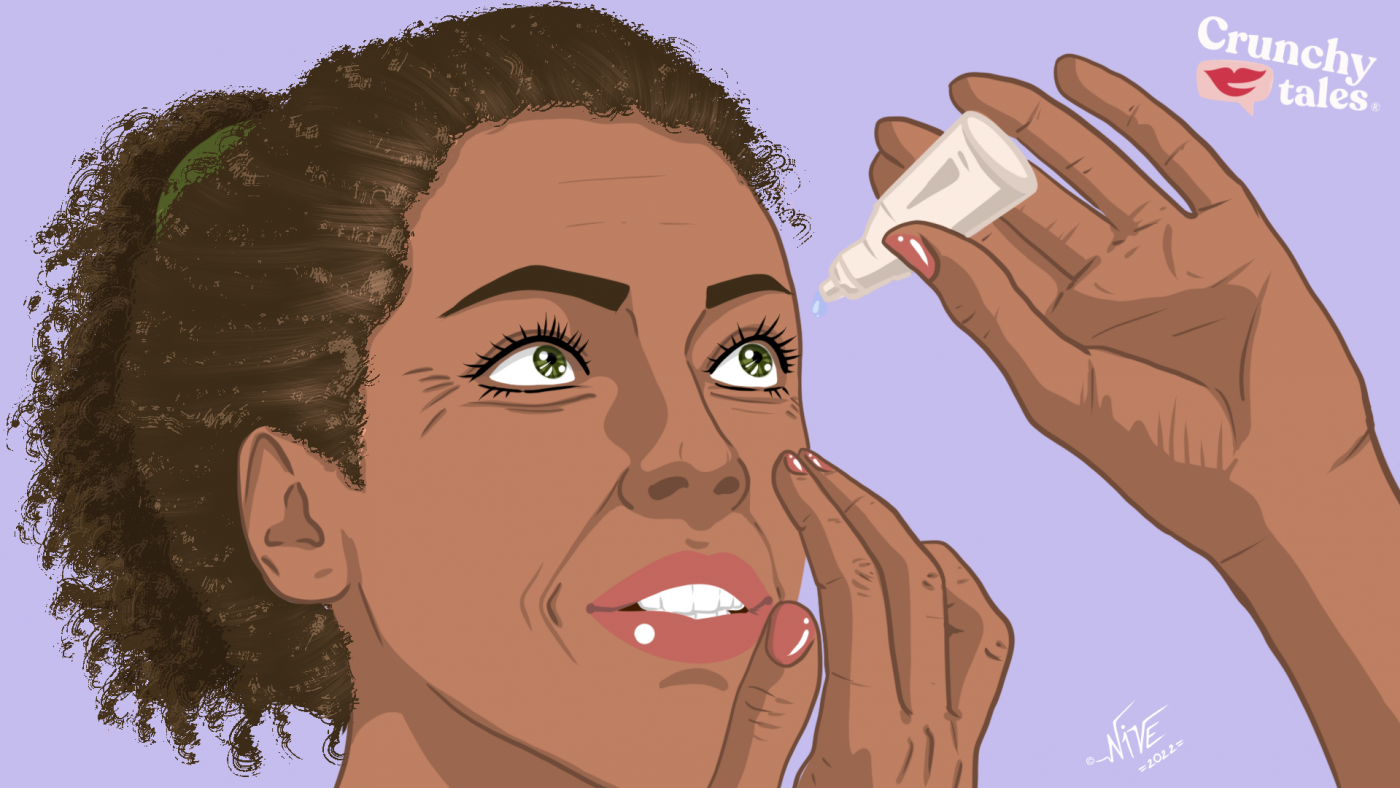Dry Eyes? These Quick Fixes May Reduce Symptoms
Are your eyes feeling more irritated, sore, and grittier than usual? Winter and the early Spring months take a toll on them, with many gen x women suffering from dry eyes. That’s caused by a lack of lubrication in the eye, which is further exasperated in colder months and especially after a certain age when tear production decreases. Ageing has an impact since our body produces less hyaluronic acid from our 40s onwards and this is key for retaining moisture in the eyes. Hormonal changes before and during menopause, and regular use of antihistamines, antidepressants, and diuretics, also affect the amount of moisture in the eye.
What’s more, the drop in humidity, colder dryer air, and wind – coupled with central heating which further evaporates any moisture in the air – are known to worsen the condition for existing sufferers as well as cause dry eye in previously unaffected midlife women.
Optometrist, Francesca Marchetti from Rohto Dry Aid notes, “Dry eye is not only very uncomfortable, if the problem is prolonged it can lead to corneal abrasions and irreparable damage to vision. Because it can make many vision-based activities, such as driving and reading, uncomfortable, it can also have a very negative impact on quality of life.”
How to prevent dry eyes
Dry eyes can upset your sleep, make reading or looking at screens uncomfortable, and gets worse as the day progresses. Here are several simple ways to help prevent the symptoms.
- Protect eyes from the elements
We know that cold air, wind and sunlight are just a handful of the factors that can influence our eye health. So even though it’s getting colder – get your sunglasses out. Wearing them can protect eyes from the glare of the sun – which can cause tears to evaporate – as well as shield them from the drying wind.
- Break the cycle
“One of the most important things you can do to ease symptoms of dry eyes is to interrupt that vicious circle – explains Francesca Marchetti -. A product that addresses all aspects of the dry eye cycle is important“. The most common type of treatment is over-the-counter eye drops or artificial tear solutions. They are affordable, effective, and easy to apply. Some contain electrolytes, such as potassium and bicarbonate, which are thought to promote healing on the surface of your eyes. Others contain thickening agents, which keep the lubricating solution on your eye surface for longer. Some of them may have preservatives, too.
- Remember to blink
Humans usually blink 20 times per minute but when concentrating on their screens this blink rate can drop to between just one and three times per 60 seconds. Marchetti advises: “Experts like me recommend that we give our eyes a break from screens every 20 minutes by looking at a distant object (20ft away) for 20 seconds and blink for 20 seconds – it’s called the 20 20 20 screen break rules.” Frequent reading and TV watching can also dry out your eyes, so it’s important to take breaks so your eyes can regain some of their moisture.
- Eat the right food
Diet can play a helpful role in good eye health. Eating more omega-3 fatty acids may relieve the symptoms of dry eyes, allowing for more tear production and higher quality tears. You can use omega-3 supplements, or eat more foods rich in this nutrient, such as ground flaxseed and flaxseed oil, chia seeds fatty fish, including salmon, tuna, sardines, mackerel, walnuts, eggs.
- Have enough sleep
Marchetti continues: “It’s during the hours that we are resting, that our body can repair and recover. That goes for our eyes too as the time they are closed is a period when they aren’t being forced to focus. Getting 7 to 8 hours of shuteye can allow for tears to be replenished and eyes to relax.”
- Take a break from contact lenses
Ensuring you sleep without contact lenses at night is essential to help avoid symptoms of dry eye and taking occasional breaks to swap lenses for glasses is a good idea to avoid irritation.
- Avoid hot air
Be mindful that central heating depletes the moisture in the air. Avoid sitting too close to radiators and when in a car, avoid having the heating vents blowing hot air at your face. It may also be helpful to get a humidifier for your home to add moisture to the air. If you don’t have it, you can put a pan of water on your radiator to improve the quality of the air. Avoid cigarette smoke: it can irritate dry eyes and increase one’s risk of developing dry eyes in the first place.
- Get your eyes checked
The British National Health Service (NHS) recommends we visit the opticians every two years for a check-up. However, there are some cases where it’s advisable to visit the optometrist more regularly. The American Academy of Ophthalmology recommends that everyone have a comprehensive eye exam around the age of 40 even if they are not experiencing any vision changes or eye symptoms. Why? Because many age-related conditions can affect your vision in your 40’s, 50’s, 60’s and beyond. Establishing where your eye health is in your early 40’s will give your eye doctor information to compare with your future visits.





